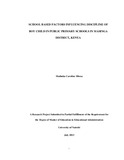| dc.description.abstract | Discipline is one of the most important factors that help social systems to function
effectively and achieve their objectives and more particularly the schools.
However, cases of indiscipline are reported in institutions of learning including
primary schools. In Masinga district, the performance of boys in National
examinations has been deteriorating compared to the performance of the girls. This
dismal performance has been attributed to high indiscipline cases by the boys. It is
against this background that this study was set to establish the school based factors
that influence discipline problems in schools in Masinga district. The study was
guided by four objectives that revolve along class teachers’ activities which
influence discipline problem in schools, the contribution of guidance and
counselling, head teachers’ training in decision making and discipline management
strategies by school administration in schools.
The study adopted a survey research design where questionnaire and interview
schedule was used as the main tool for data collection. The teachers, head teachers
and pupils in the 131 public primary school Masinga district were the target
population for the study. The district has a population of 20520 boys, 19837 girls
and 1077 teachers. The sample size constituted 410 pupils, 215 teachers and 13
head teachers in public primary schools in Masinga district. Through data analysis
the study established that the main causes of indiscipline in schools is peer
pressure, lack of guidance and counselling, environmental factors, poverty and
sand harvesting in that order. The results also indicate that boys were more
involved in indiscipline cases compared to girls. On the strategies used in schools
the study established that Guidance and counseling was the main strategy ( 93.7%)
used to curb indiscipline cases in schools. Other strategies include; Dialogue with
pupils (73.6%) and referral to parent (66.5%). Based on the findings of the study,
the study recommends that, the school administration should make the final
discipline decision in collaboration with the School Management Committee.
There is need for teachers, parents and pupils to collaborate and identify children
who cause problems to others with a view to subjecting them to a comprehensive
guidance and counselling program, there is a need to make guidance and
couselling more regular and specific teacher should carry out counselling sessions
by meeting pupils once a month with a view to helping the deteriorating discipline
of the boy child. Peer counseling should also be introduced in schools. The study
suggests that there is need for another study to collect views from parents,
education officers, security agencies and members of the community who are also
key stakeholders as far as indiscipline in public primary schools is concerned . | en |

